 |
 |
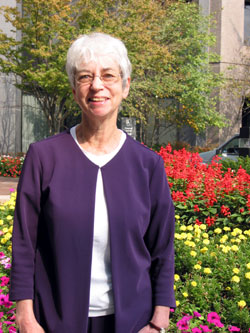
|
|
Malka Scher, J.D., Ph.D., Patent Lawyer and Technology Transfer Specialist, Technology Transfer Branch, National Cancer Institute, National Institutes of Health
|
1. I chose this career because...
2. My typical workday involves...
3. What I like best/least about my work …
4. My career goals are…
5. When I’m not working, I like to…
6. Carving my own path...
|
|
1. I chose this career because...
|
Back to Top

|
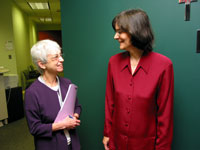
|
|
Malka Scher greets colleague outside her office.
|
I chose to become a patent lawyer because I was looking for a new challenge. I had taken some courses in a paralegal department, and enjoyed reading the case law. That was the kind of challenge I wanted. I worried about entering the profession though, because I knew it required good oral communication skills. I doubted my public speaking abilities, but decided to give it a try anyway.
I have a Ph.D. in biochemistry and started my career doing laboratory research. Though I enjoyed research for many years, eventually I wanted to explore other types of work. Patent law seemed to be the perfect way to stay in-touch with the latest research, while developing new skills.
Even though I have a law degree, I do not work like a typical patent lawyer. I use my background in science and law to perform my duties as a technology transfer specialist for the NIH. You can read more about this specialty below. (See My typical workday involves..., or read about related jobs biochemist and patent lawyer).
Education
- Bachelor of Science, Chemistry, Goucher College, Maryland
- Doctor of Philosophy, Biochemistry, Johns Hopkins University School of Medicine, Maryland
- Doctor of Jurisprudence, University of Maryland School of Law, Maryland
|
|
2. My typical workday involves...
|
Back to Top

|
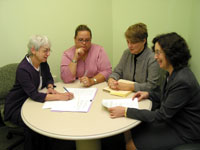
|
|
Malka Scher and other Technology Transfer Branch employees work on a clinical trial agreement.
|
My typical workday is occupied with the tasks I do as a technology transfer specialist (TTS).
Technology Transfer is a relatively new field that involves the legal transfer of materials between organizations. A technology transfer specialist (TTS) facilitates the transfer of materials by preparing the appropriate legal documents. The TTS must understand the science, the legal, and business aspects of the transaction so that the interests of all parties are understood and protected.
At the NIH, research scientists often form collaborations with scientists at other institutions to further their research goals. The types of materials transferred may be anything used in research, including proteins, chemicals, computer software, or equipment. The types of organizations to which materials may be transferred include other research institutes, universities, and private companies. For example, an NIH researcher may have a unique antibody that a scientist at another research institution wants to use in their experiments. As a TTS, I can help them complete the appropriate legal documents.
My major tasks are to:
- Prepare appropriate legal documents like:
- Material transfer agreements – legal documents that cover the transfer of materials between organizations.
- Confidentiality agreements – legal documents that deal with disclosure of information
- Cooperative research and development agreements – legal documents that describe the scope of a research project and governs the rights in discoveries that may arise from this research. Sometimes the discoveries are considered to be new inventions. These agreements are made between a governmental agency and a private company or non-profit organization such as a university.
- Clinical trial agreements – legal documents that govern the interaction between a company that provides a new therapy or treatment, and the NIH that uses it to conduct a clinical trial.
- Meet with NIH scientists, whom I represent to discuss their particular needs. We always work with the same laboratories or institute. In that way, we can become familiar with the research they are doing, and they know who to contact when they need legal assistance.
- Negotiate agreements with other attorneys or technology transfer specialists at other organizations.
- Assist scientists with the steps leading up to filing a patent for a new invention. At NIH, patent protection on new technology may help to interest a company, such as a biotech company or a pharmaceutical company, in incorporating the technology into a product that can benefit public health.
- Attend regular meetings with other technology transfer specialists from other NIH institutes. These meetings may focus on issues that are of interest to the whole group. For example, most agreements are approved NIH-wide, but we don’t have a good software development agreement yet. Some TTSs are working on that, and we may use our meeting to discuss the project’s progress. At other meetings, we may invite a visitor or an outside attorney to speak about relevant issues.
- Consult and advise colleagues. Our work environment is collegial. Although we are a large office, we are divided into units of approximately ten individuals per unit. As a deputy unit coordinator, I work closely to consult with, and advise, other members of my unit.
- Occasional presentations describing the work we do to scientists whom we represent.
|
|
3. What I like best/least about my work …
|
Back to Top

|
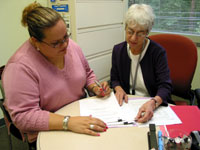
|
|
Malka Scher advises a colleague on a material transfer agreement.
|
What I like best about my work is the large variety of tasks I do. No two days are identical.
I enjoy reading about the cutting edge scientific research that is going on at NIH, researching and reading about legal issues, drafting agreements and assisting investigators in writing research proposals, and working with my scientist and technology transfer colleagues.
What I like least about my work is the challenge of balancing the workload. It is difficult to predict exactly when the workload will increase. Often the work is time sensitive and must be completed by a certain date. This can cause a lot of pressure. Another frustration is when cases drag-on for a long time, because of the complex negotiations involved. I would prefer to complete tasks quickly.
|
|
4. My career goals are…
|
Back to Top

|
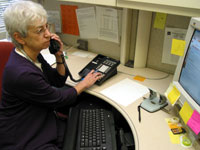
|
|
Malka Scher returns a phone call at her desk.
|
My career goals are to continue to expand my knowledge in my current job. I don’t anticipate changing jobs or career fields, because being a TTS incorporates my skills in science and law. Since new challenges arise everyday, there is always an opportunity to learn new things.
|
|
5. When I’m not working, I like to…
|
Back to Top

|
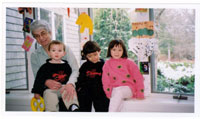
|
|
Malka Scher plays surrogate grandmother to children in her family.
|
When I’m not working, I like to spend time with my daughters, son-in-law, husband, and extended family, which includes a 21-month old boy, and a golden retriever. My dog’s extended family includes a dalmation and two bull terriers. The most important part of my life is my family. I have always felt that being a stay-at-home mom was an invaluable gift to young children. So I chose to stay at home with mine. At the same time, I loved working in the laboratory, and returned to work once my children were in elementary school. I have always enjoyed relaxing hobbies where I worked with my hands: calligraphy, knitting, and crocheting. My skills in science are much greater than my abilities in my hobbies, but that is my relaxation.
|
|
6. Carving my own path...
|
Back to Top

|
|
|
At the time I went to high school and college, it was unusual to be a woman interested in science. I liked asking questions and the challenge of finding answers in the laboratory. Similarly, when I went to law school, after working for many years in science, it was unusual to be so much older than my classmates. Many of them were the ages of my children. Nevertheless, my goal was to learn patent law so that I could see research results translated into practical applications.
|
|
|
|
 |